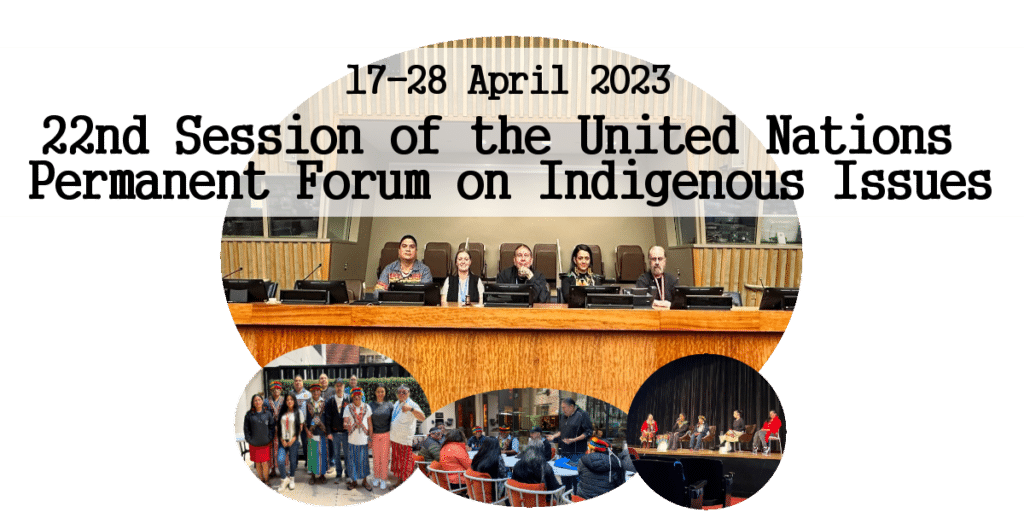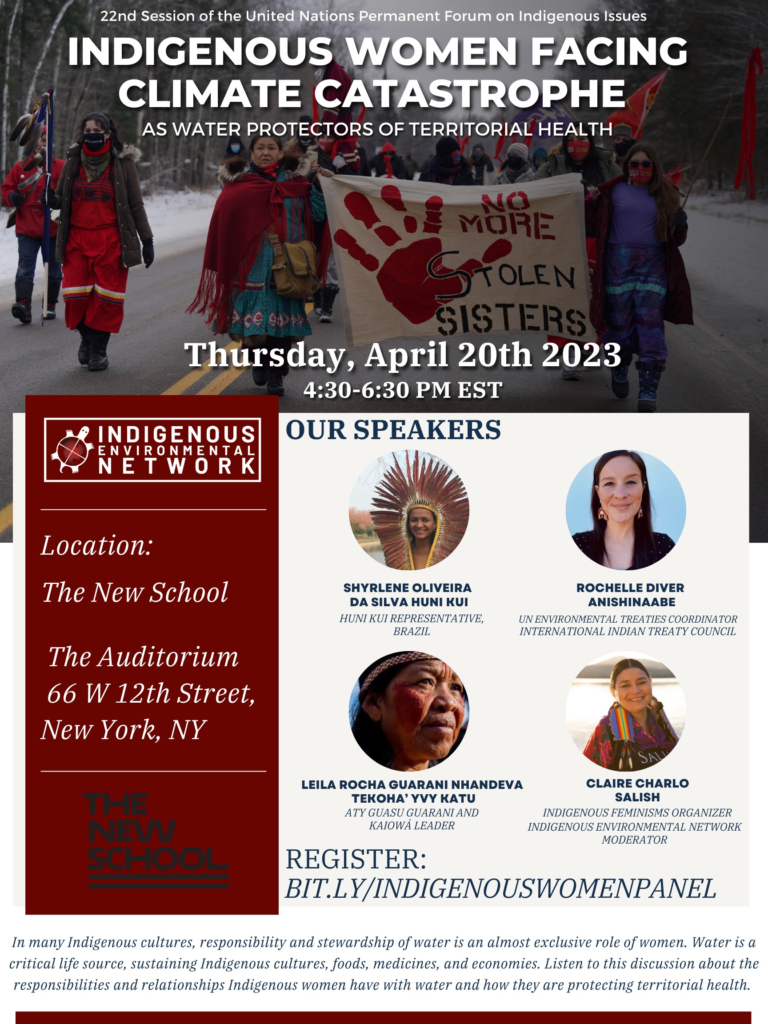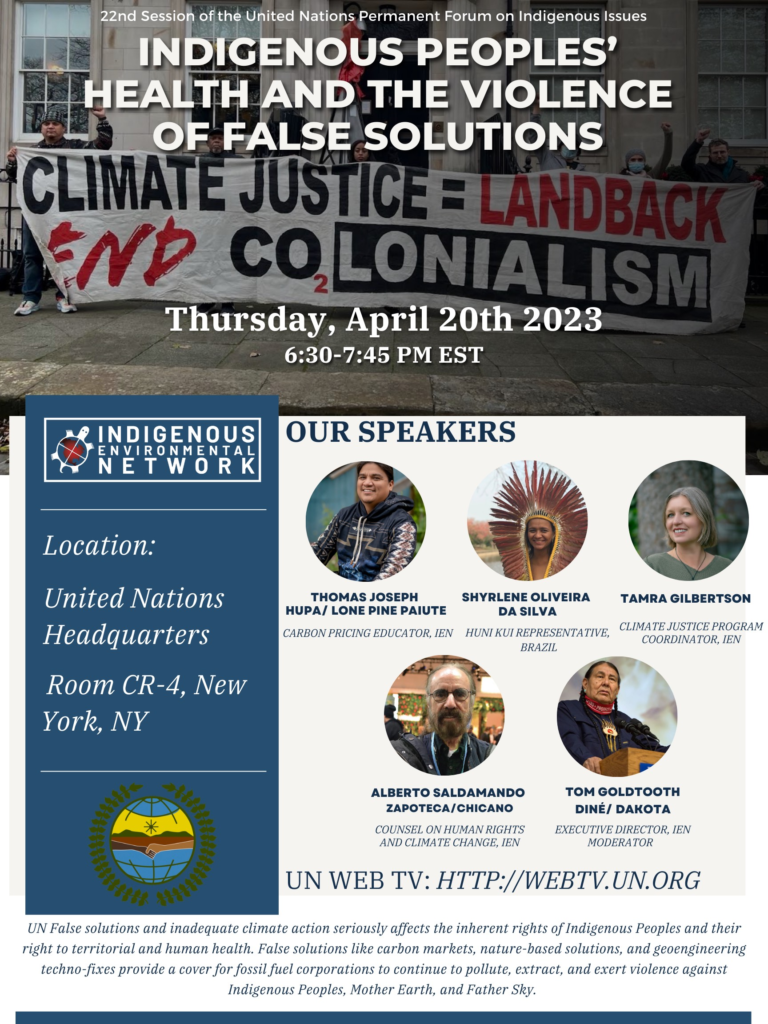
“Item 4 on the six mandated areas of the Permanent Forum (economic and social development, culture, environment, health and human rights), with reference to the UN Declaration on the Rights of Indigenous Peoples and the 2030 Agenda for Sustainable Development” – Intervention by Thomas Joseph, IEN staff
Date: 25 April 2023 – Session open 3-6 PM EST
Greeting Chairperson, Indigenous Peoples of the Mother Earth and States,
I am a Hoopa Valley Tribal Member of the village of Tsewenaldin in the six rivers forest as well as Shoshone Paiute of Payahunnda
I am here with the Indigenous Environmental Network (IEN).
IEN has long advocated for the protection of Mother Earth and has made many efforts to educate about various efforts to harm her, as well as the Indigenous Peoples that are inherently related to their ancestral lands, waters, and air.
We have made interventions regarding false solutions to address climate change, including at this Forum, as these false solutions do not address the release of greenhouse gases at the source.
Many cause direct and indirect harm to Indigenous Peoples.
This intervention is to suggest what we are for,
a way forward for Indigenous Peoples without reliance on extractivism in all its guises.
The Indigenous Principles of Just Transition (IJT) provides a framework for not just economic re-orientation but also includes strategies to address human health, planetary and territorial health and climate change.
It incorporates not just a right-based approach, but also a responsibility-based approach based on our respective spiritual-cosmovision and cultural ways that comprise our Indigenous political/legal systems.
From our collective research and discussions, it is apparent that Indigenous Just Transition stands in its own right, and parallels some of the Eurocentric based Just Transition,
but diverges in significant areas, especially in relation to what is deemed the right to development and related development projects.
On the one hand, Just Transition is linked to jobs and job creation as well as occupational health, whereas Indigenous Just Transition is focused upon a Healthy Community from a broader social context, and job creation within an Indigenous Knowledge value system unique to the respective Indigenous political reality.
Spiritual Responsibilities form the core of Indigenous Just Transition.
Indigenous Just Transition is not just about exercising rights, but rather focuses on responsibilities to family, community, Indigenous Nation, and their inherent relationship with the land, water, and air.
The issue of educating and implementing an Indigenous Just Transition solution is complex.
It is our hope that the Forum engages in a process to embrace the concept and work with Indigenous Peoples to further develop the key concepts, create an education strategy, and assist in implementation strategies of the UN Sustainable Development Goals-Agenda of 2030.
Thank you.
I am here to speak as a mother, as a culture holder. I’m here to speak for the future generations. I’m here for the animals, the winged, the rooted, those that swim, for all our plants and medicines. There are attempts to commercialize nature, trying to commodify Mother Earth.
We are an Indigenous group of experts, on health, national and international policy and women’s issues. The continued onslaught. In 2015, World Banks began pouring trillions into an extractive, dying fossil fuel industry. 5.5 trillion has financed continued extractive and destructive fossil fuel projects in Indigenous communities throughout the world.
Indigenous People are on the front lines of climate change. The so-called escape hatch of climate catastrophe are false solutions. Carbon markets and storage conservation biodiversity, along with offsets of the UN mechanisms like 30 by 30 Nature based solutions and REDD. These are all forms of privatizations of natural life. The geo-engineering experimentations by technology is a violation of Indigenous cosmovision and our relationship with Mother Earth and Father Sky. Industries want to use whale and buffalo as carbon offsets, which also goes against Indigenous relationship and responsibility to Mother Earth.
We are asking for a forum to support our moratorium against these UN mechanisms and we call upon a special future session, as soon as possible, due to the urgency we ask that this be included in the next session.
Indigenous Environmental Network also supports the United Nations Permanent Forum on Indigenous Issues urges Indigenous Peoples, states and the United Nations to ban genetically modified trees, forests, biodiversity and Indigenous Peoples.
IEN stands in solidarity with all Indigenous peoples around the world that are battling the aftermath and current activation of carbon markets and fossil fuel extraction.
The Forum calls upon the UNFCCC COP and Parties to the Paris Agreement (PA/CMA) ensure that the Article 6 Governing Body does not allow offsets to NDCs that were generated in whole or in part by violations of Indigenous rights, particularly their right to territorial and human health, such as their production and consumption of their traditional means of subsistence, and their Sovereignty and Self-determination.
The Forum, keeping in mind the IPCC’s Synthesis report of March 2023, and recalling the Secretary General’s conclusion that humanity is committing suicide with its addiction to fossil fuels, calls upon the PA/CMA to avoid false and unproven solutions to global warming, particularly those that affect Indigenous Peoples’ human and territorial health, in Article 6 and other mechanisms of the Paris Agreement, including, inter alia, so called technologies which are tested on Indigenous Territories, such as Carbon Dioxide Removals (land and ocean based carbon offsets, CCS, CCUS, DAC, Ocean Fertilization etc.), Solar Radiation Mitigation (Stratospheric Aerosol Injection such as Scopex, Surface Albedo modification such as Arctic Ice Project), and Marine Geoengineering (other forms of ice modification, Marine Cloud Brightening, and Ocean Fertilization.
The Forum notes that current administrative processes of the United Nations do not facilitate Indigenous Peoples’ participation and therefore requests that the Secretary-General instruct relevant United Nations entities, particularly the UNFCCC COP and PA/CMA to ensure Indigenous Peoples’ full and effective participation as Peoples and not as civil society or local communities, but as Peoples, in all PA national, regional and international processes and make the necessary arrangements as a matter of urgency. The Permanent Forum recommends that the United Nations system continue to build the capacities of Indigenous Peoples and their organizations, consistent with their cultures, languages and world views, to develop their knowledge and skills to have their rights respected, protected and fulfilled.
The Forum notes with concern the unsatisfactory World Bank and other international banking and funding institutions’ policies regarding the funding for vulnerable States and Indigenous Peoples, and calls for an independent funding mechanism or entity for direct grants to Indigenous peoples and vulnerable states. This includes ensuring direct grant funding through the Loss and Damage Finance Facility (LDFF). International Financial Institutions (IFIs) should not demand loan paybacks or earn returns on vulnerable states.
Strict adherence to the participation of Indigenous Peoples in development projects continues to be lacking and the Forum recommends that greater efforts be directed towards compliance machinery within the Bank and other IFIs with regard to development projects from the inception of any planning, when dealing with projects and design and approval processes, continuing throughout to post-project enforcement mechanisms.
Keeping in mind the theme of this session, the forum reiterates Paragraph Number :28 of Session:4 (2005):
The Forum encourages the Food and Agricultural Organization of the United Nations (FAO) to recognize the importance of and emphasize support for indigenous agricultural systems, including forestry, shifting cultivation, fisheries, livestock, pastoralism and hunting-gathering systems, and their associated biodiversity, foods, knowledge systems and cultures. It encourages FAO to promote the responsible use of culturally appropriate agricultural inputs and technology so as to protect the traditional livelihoods and life-ways of indigenous peoples and protect their agricultural systems from the carbon market.
The Forum takes note that their recommendation that the Conference of the Parties to the United Nations Framework Convention on Climate Change sponsor a workshop to discuss the merits and mechanisms for the establishment of a working group on indigenous peoples has not been initiated and repeats its call as an urgent matter.
The Forum as an urgent matter also repeats its recommendation that the United Nations Framework Convention on Climate Change establish an ad hoc open-ended intersessional working group on indigenous peoples and climate change, whose objectives would be to study and propose timely, effective and adequate solutions to respond to the urgent situations caused by climate change. The Forum furthermore recommends that the Convention consider providing necessary funding support to Forum members and indigenous peoples to guarantee their participation and to strengthen their participation.
The inadequacy of the UN reducing emissions from deforestation and degradation (REDD and REDD+) program must be addressed. Indigenous Peoples collective rights, and the negative effects on their right to territorial and human health, such as their production and consumption of their traditional means of subsistence, and their Sovereignty and Self-determination have not been substantiated through the REDD process. Therefore, the Permanent Forum recommends to the PA/CMA that all REDD programs and projects go through a full review by the UNFCCC, with the full and effective participation of Indigenous Peoples Organizations to assess the validity of programs that claims to:
1.reduce emissions from deforestation;

In many Indigenous cultures, responsibility and stewardship of water is an almost exclusive role of women. Water is a critical life source, sustaining Indigenous cultures, foods, medicines, and economies. Listen to this discussion about the responsibilities and relationships Indigenous women have with water and how they are protecting territorial health.

UN False solutions and inadequate climate action seriously affects the inherent rights of Indigenous Peoples and their right to territorial and human health. False solutions like carbon markets, nature-based solutions, and geoengineering techno-fixes provide a cover for fossil fuel corporations to continue to pollute, extract, and exert violence against Indigenous Peoples, Mother Earth, and Father Sky.
UN Headquarters, New York City- The 22nd United Nations Permanent Forum on Indigenous Issues (UNPFII) opened this year’s gathering with a clear message that critical action is needed to address Indigenous Peoples’, human, and planetary health in a rapidly changing climate. While the UNPFII and the UN bodies aim to stress this important message, in reality the escalating environmental violence Indigenous Peoples face as environmental defenders on the frontlines remains unaddressed. As we are participating in the second week of the Permanent Forum, the Indigenous Environmental Network (IEN) continues to stress how Indigenous Peoples are at the forefront of climate change and continue to survive in the face of environmental violence. While extractive industries continue to mine, frack, combust, and experiment with Mother Earth’s blood and bones, the climate false solutions of carbon markets, offsets, and geoengineering legitimize continued extractive industry violence.
Indigenous Peoples are environmental defenders stewarding almost 80% of Mother Earth’s biodiversity on our lands, waters, and territories. Protecting and restoring Mother Earth is at the heart of Indigenous Peoples’ cosmologies and original teachings. These acts of labor and care keep the planet alive. In addition, Indigenous Peoples continue to resist and defend territories from the violence of extraction from the fossil fuel and agribusiness regimes.
According to Human Rights Defenders Memorial data, just five countries including Colombia, Ukraine, Mexico, Brazil and Honduras made up for over 80% of killings with Colombia accounting for 46% of the total. Indigenous Peoples, working on land and environmental rights were the most frequently targeted, accounting for almost half of the total killings. Tom BK Goldtooth, Executive Director of the Indigenous Environmental Network stated, “Indigenous Peoples are at the forefront of evacuations and escalating environmental violence, while holding the most valuable and biodiverse lands and waters on this planet. Multinational extractive corporations hire private security to target, pressure and threaten Indigenous Peoples.”
Environmental violence has a multitude of impacts on Indigenous Peoples’ health and wellbeing. Multilevel impacts related to environmental, cultural, and social violence include: traumatic violent events, evictions, cultural erasure, death threats, racism and discrimination, food and water scarcity, contaminated water and food, as well as missing and murdered Indigenous women and relatives.
“Imposed energy extraction in conjunction with more preposterous false solutions is a continued vicious attack upon our ancestral homelands and the very essence of our inherent sovereign rights and self-determination. Extractivism and False Solutions perpetuate destruction and climate chaos and do not actually address the current state of Global climate crisis we are in. We observe further plans to subject what we deem as sacred to our way of life and our food security. Our sacred Whales, Bears, and Caribou are being promoted as carbon offsets, just as our trees are being sold in the carbon markets. This is to the detriment of our way of being, and the benefit to the colonialist fossil fuel and carbon based economy. Common sense dictates that we cannot create more harm when trying to address harm”, says Faith Gemmill, from Arctic Village, Alaska and board member of IEN.
The violence of extractivism continues due to the distraction and deception of false solutions that block climate change mitigation from phasing out fossil fuels and other extractive energies. Compared to 2020, the World Bank estimated a record 60% increase in global carbon pricing revenue (USD 86 billion) in 2021. Voluntary offset markets have also increased reshaping incentives for carbon brokers and managers to pressure Indigenous Peoples into offsetting their territories resulting in more environmental and climate violence. Governments increasingly justify the revenue as a way to increase market-based mechanisms for “broader policy objectives” and to restore depleted public finances, while ignoring how Indigenous Peoples’ territories are targeted and co-opted by this misleading agenda.
IEN made interventions requesting the UNPFII to recommend a special session on false solutions and impacts on Indigenous Peoples, including a moratorium on all false solutions activities until the impacted Indigenous Peoples are able to fully investigate the impacts and make appropriate demands.
Jordan Harmon, Policy Analyst and Legislative Advocate at IEN stated, “Greenwashing and false solutions are creating a cover for historic polluter states, like the United States, to continue expanding fossil fuels and to continue emitting greenhouse gasses. At the same time, false solutions like experimental geoengineering and market/nature-based solutions, have created a modern-day land grab where projects are being deployed without the knowledge or informed consent of impacted Indigenous Peoples. The UNPFII has a responsibility to provide the space, such as a special session, for us as Indigenous Peoples to investigate the impacts of false solutions and to make recommendations and demands to the larger UNFCCC body.”
Carbon markets, offsets, and increasingly biodiversity markets pose a serious threat to Indigenous Peoples’ autonomy and territories. The solutions pushed under the UNFCCC and the UNCBD are false solutions that actively perpetuate the climate crisis. In addition to climate market regimes, false solutions include geoengineering techno-fixes such as the Arctic Ice Project, carbon capture and storage, direct air capture, and solar radiation management such as the SCoPEx initiative.
“Indigenous Lands, waters and territories have been forced to serve as the stepping stool and dumping ground of extractive industry, and now we are forced to do the same with the greenwashed techno fixes of climate geoengineering. Academic and non-academic geoengineers alike are testing and experimenting their technologies on our lands without our knowledge or consent. Governments, fossil fuel interests and billionaires continue to fund these so-called technologies in order to meet “net-zero” targets. All the while exposing Indigenous Peoples to toxic materials, risking drought and irreversible damage to the ecosystems we have been in relationship with since time immemorial”, said Panganga Pungowiyi,IEN Climate Geoengineering Organizer.
###